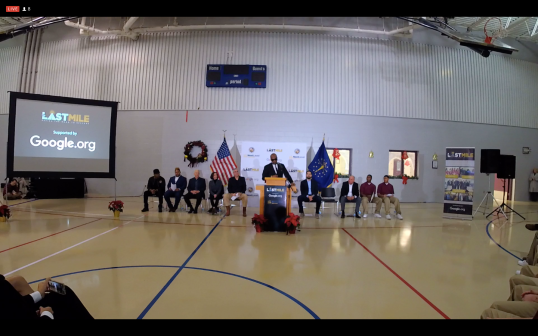D.C. author says future of college will be online

As technology transforms the way students across the country are taught and tuition costs keep rising, many question whether the traditional college model will be sustainable.
Author Kevin Carey argues that colleges will be turned into the “University of Everywhere,” in which students from around the world can enroll in virtual schools that are free and have an open admissions process.
“We will be engaged in global learning communities that are built around digital learning environments, and educational software that is much better than anything we have now and much less expensive,” said Carey at a New America Foundation event, where he was promoting his new book, “The End of College: Creating the Future of Learning and the University of Everywhere.”
Carey, who is also director of the education policy program at the Washington, D.C.-based think tank, said he was prompted to write the book after stressing out about how he would pay for college for his daughter, who is now 4 1/2 years old. When she turns 18, he said, it will be 2028.
“Is it going to be pretty much like college as I went, with just some technology on the side, or is it really going to be different?” he said. “I concluded it really is going to be different.”
Carey, through his research for the book, said that college will likely still be a physical institution where students can gather, interact and exchange ideas – but a big chunk of their time will be spent in a “virtual state of online education.”
On massive online open courses
Carey drew on his experiences taking a MOOC, or massive online open course, through an online learning program run by Harvard University and the Massachusetts Institute of Technology, called edX. He decided to take a biology class that all MIT freshmen are required to take, which was taught by a distinguished professor in the field, Eric Lander.
Carey came away impressed.
“The thing that amazed me about this class was it was a very faithful translation of exactly the same class that MIT undergrads were taking,” he said, adding that the lectures were taped live and then posted online two weeks after they were given at the university.
“There were 100 students in a lecture hall and 10,000 students around the world watching the same lectures, doing the same homework, taking the same midterms and finals, doing all the same problem sets on the same time frame,” he said. “That did kind of impress upon me that we’re here now; what can we do with the future?”
On motivation
Carey also successfully completed an online philosophy course through for-profit educational technology company Coursera, but said the class wasn’t very challenging.
He admitted he signed up for other online courses out of curiosity, but didn’t finish them because he wasn’t motivated to write about them for his book. He said many people who sign up for MOOCs already have degrees, which doesn’t provide a strong enough incentive for them to complete the courses.
“I think MOOCs are outside the path to a degree,” he said. “If you can actually take these classes and authentically get a degree that gets you a job, I think people would be in a different state.”
On the future of teaching
Carey said it is inevitable that technology will replace traditional teaching models, but said the real question is to what extent.
“It’s forcing people to be a lot more specific about what they mean by words like teaching and education,” he said of technology. “One way or the other, the long-term trend is technology will be able to replace more educational labor. Colleges are designed to not really care enough about whether they are teaching as well as they can.”
He added that coding courses, which are offered around the country through tech startups and nonprofit organizations, can compete with master’s degrees – for much less money.
“If someone can go spend $10,000 and 10 weeks of their life to get a credential that will get them a job, as opposed to $60,000 and two years of their life to not even get the same job, I think that’s a good thing,” he said.
On elite universities
Though Carey said that the “barriers to creating new universities are much lower than we realize,” he also acknowledged that universities with elite names and brands still have a certain pull.
“I think there will always be a prestige market,” he said. “There will always be institutions where, essentially, their job is to acculturate children of the ruling class.”
But frequently debated is the tenuous yet growing relationship between Silicon Valley and higher education, which is embodied by the Minerva Project.
The Minerva Project is a university started in 2012 that strives to be an Ivy League rival. It’s run by the former CEO of online photo company Snapfish, Ben Nelson, who does not have a background in education.
Students who enroll take interactive, online classes rather than large introductory lectures through Minerva’s videoconferencing system, and then they are split into groups to travel the world, according to its website.
Carey said it’s a model worth looking at when students have turned down spots at name-brand institutions to enroll in Minerva.
“It’s just one example of creating something new,” he said.





